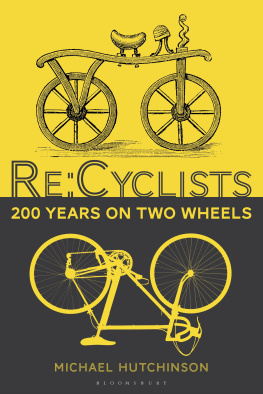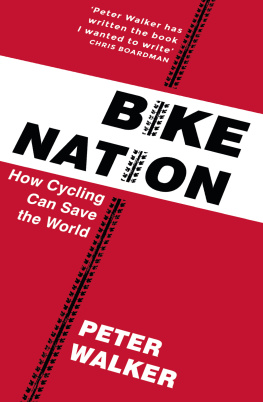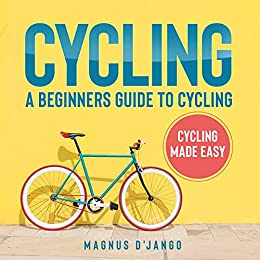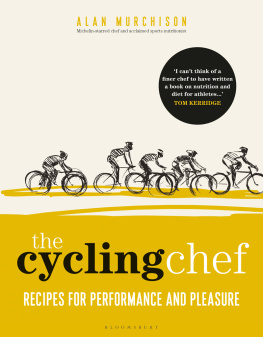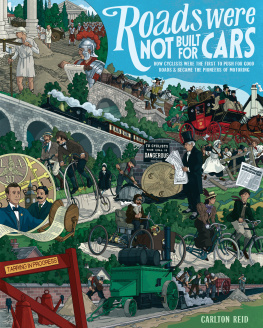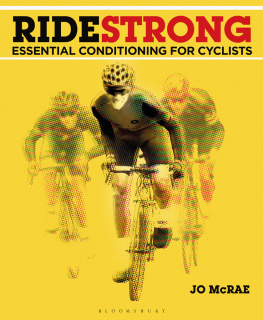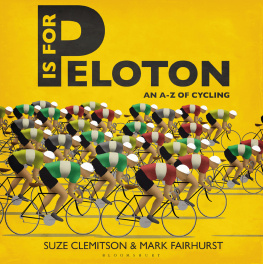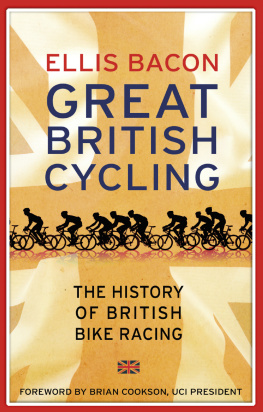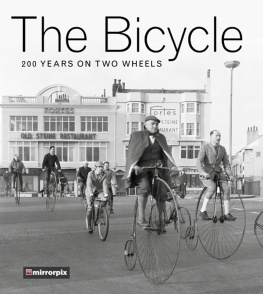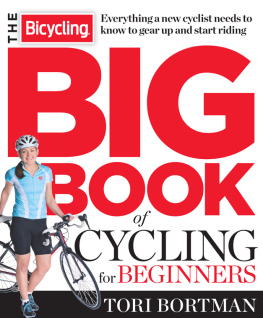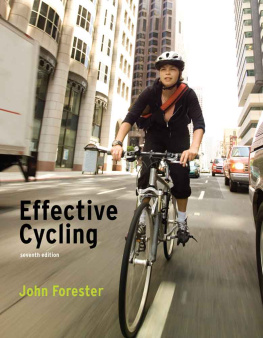For Louisa

Contents
Many of lifes defining moments pass almost unnoticed at the time. It often takes weeks or months or longer for the significance of a chance meeting or an unexpected phone call to become clear. When an unfamiliar girl at college put her head round the door of my room to ask me to turn the music down, it was not immediately apparent that we would be spending the next twenty-something years living together. Instead I scowled and told her that I turned down the towering genius of Leonard Cohen for no one, least of all Abba-fancying philistines like her. She rolled her eyes and slammed the door, and I think we probably both assumed that that was that.
Some pivotal events, on the other hand, are hard to miss. Take what happened to me around lunchtime on 6 June 1999, for instance.
Id just finished riding a National Championship bike race in North Yorkshire. It was a warm summer day, and it had been a hot race. I was tired and a bit dehydrated. I was also very, very pleased with myself, because Id just finished fifth, only a few seconds off the podium, which had been my best result in that race to date and had been the result of a very carefully planned campaign and a lot of hard work. I was, therefore, cheerful, satisfied, perhaps even a little smug and generally in the highest of spirits as I walked into the pub where I was staying to collect the key to my room from behind the bar.
I had come straight from the race. To be specific about it, I was wearing a time-trial helmet with a large point at the back and a mirrored visor at the front. I was still in my racing skinsuit, which was exceptionally tight and, in the whiter bits at least, had a pinkish translucence. My smoothly shaved legs ended at a pair of shiny silver cycling shoes, the futuristic-superhero effect of which was undermined by the hard carbon-fibre soles that meant I had to walk in very tiny steps to avoid slipping on the stone floor.
The bar was packed for Sunday lunch. The loud clack-clack that accompanied every mincing step meant that heads started to turn. Then conversations petered out. Forks stopped halfway to mouths. Behind the bar, beer poured unwatched over the rims of glasses and into drip-trays. It wasnt the sort of pub people played darts in at lunchtime, but if it had been, the darts would presumably have stopped in mid-air. It felt like the special video-effect where the people freeze-frame and the camera pans around them.
I clacked across the unnaturally quiet bar, and asked the landlord for the key to room three. He took it off a peg and set it on the counter. Then, in a moment of exuberance, I said, And a pint of Theakstons XB, please. I suppose the idea was that this would break the tension, everyone would laugh and smile and perhaps Id be hoisted aloft and carried in celebration around the bar.
That did not happen. I still looked the way David Bowie would have looked in the mid-1970s if his alter egos had been designed by a focus group, except that now I had to stand at the bar and drink a pint in a calm, unhurried fashion. People told their children to stop staring at me, even as they held their own gazes on me steady and unabashed.
I still didnt care. For probably the first time in a rather self-conscious life I was quite happy to look the fool. That morning, perhaps during the race, perhaps on the ride back the couple of miles from the finish-line to the pub, perhaps just as I crossed the bar, a real pride in being a cyclist had sprung up in me. I loved what I did, and I loved all the people I did it with. Anyone who didnt like looking at odd strands of my body hair through the pinkish bits of my tight, tight suit could get knotted. I stood there and lifted my pint with an air of, One day, my friends, you will all be like me. I was right, and everyone else was wrong. It felt magnificent.
What can I say? Adrenaline and jubilation can do terrible, terrible things to people. If I wasnt embarrassed then, I certainly was later. But the pride was real. I was a cyclist, and there was nothing else Id rather have been. Thats still very much the case.
I wasnt born a cyclist. I didnt come from a cycling family, nor did I take it up young. I came to it late, and entirely by accident. My girlfriends father had lent me one of his racing bikes and suggested I might enjoy a spin. Within about ten miles I felt ready to devote the rest of my life to riding bikes. I spent a blissful summer riding it for miles round Londons parks, or out of the city into Surrey or Sussex, just wearing a running vest and a pair of old rugby shorts and having the time of my life.
My happiness was only increased when I started racing and discovered that, not only did I like it, I was good at it. I read magazines and books; I went to stand on chilly roadsides to be a third of the two-men-and-a-dog who traditionally watched British races. I went from neophyte to dyed-in-the-wool bikie in about six months. There was nothing about cycling that wasnt exciting, nothing I didnt want to do.
Cycling does this to people, and Im not surprised. To sit on something as simple and brilliant as a bike is to become a better, faster, nimbler version of yourself. A bike isnt artificial. It doesnt separate you from your surroundings. It is very much whatever you want it to be. There are surveys that claim to have identified anything up to 60 different sorts of bike rider from full-gas racer to someone riding to a village shop, to an urban cyclist whose idea of a perfect Sunday afternoon is putting on a vintage racing-jersey and going to sit with their bike at a table outside a caf. You can even switch from one type to another with nothing other than a change of purpose Ive probably been most of the sixty at one time or another, and often several within the space of a single ride.
I dont think it would be possible for me to stop being a cyclist. Even if I never rode a bike again, I think Id still be a cyclist before I was anything else. Ive made my living in cycling. It was never part of my life plan, but how could I resist the opportunity? What on earth else would I prefer to do? I raced professionally for several years, and when that ran out I started writing for a cycling magazine. The magazine was Cycling Weekly , which was first published as Cycling in 1891, just as the penny-farthing era was ending and the safety bicycle was taking over.
With all due respect to my colleagues, by some distance the best thing about their office was their archive. Other than the odd Christmas, the magazine hasnt missed a week in well over a hundred years. The copies are bound into large six-month volumes. I used to sink into one of those like a time traveller. I could spend an afternoon that had been earmarked for something a bit more useful working my way through a random interwar year, following the fortunes of the racers, the journeys of the touring correspondents, the arguments about bike lanes, compulsory lights and even helmets. There was something special about seeing the past through the eyes of people just like me, people who were first and foremost cyclists. Their concerns were sometimes very modern-feeling, while their worlds were rather different. It was nice to have a familiar perspective from which to look at the past.
The magazines always referred to their remit as the sport and pastime of cycling. Its an unfussy phrase that crops up again and again. It sounds like it ought to be in the text for some sort of sermon: the two sides of cycling, often the concerns of the same riders, the same clubs, the same writers. It tidily gathers together all that was and is best about riding a bike, both the fury of competition and the pleasure of time wasted well.

